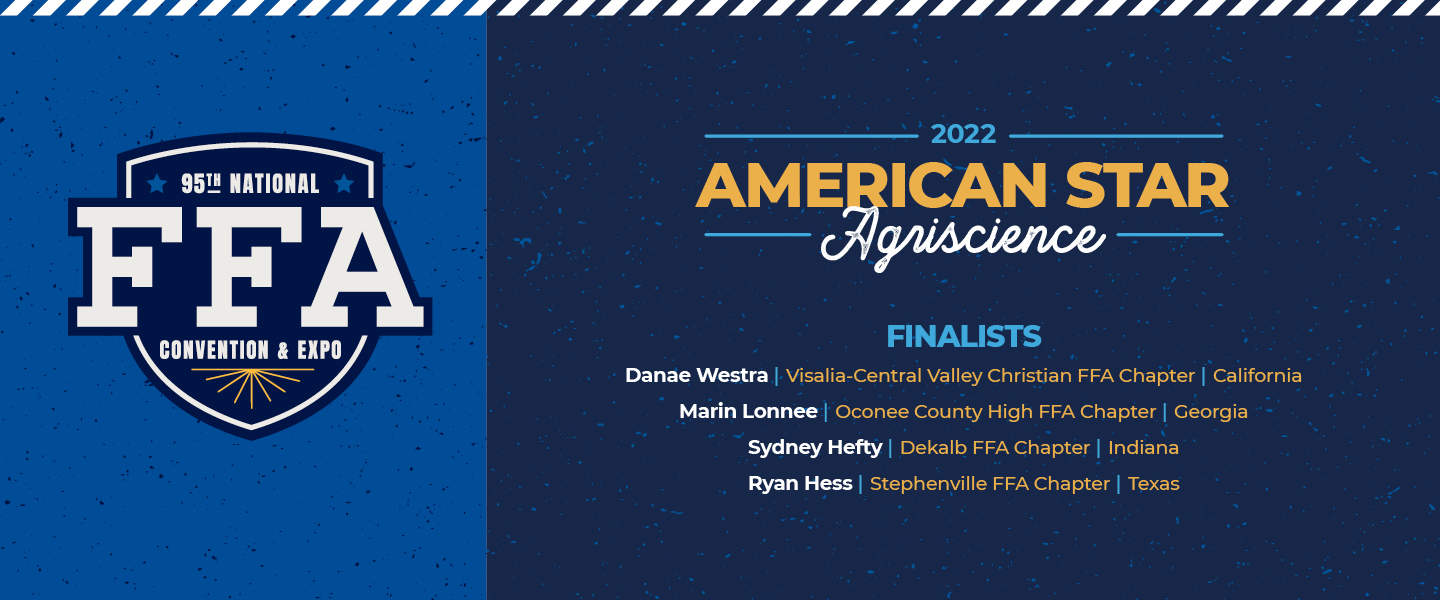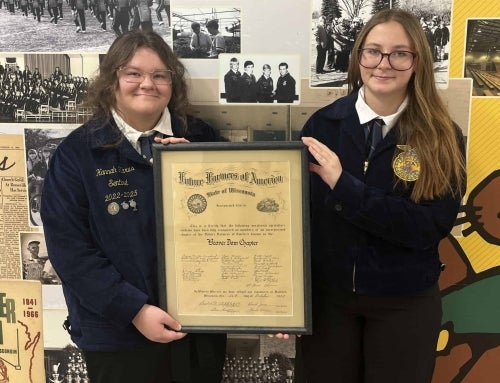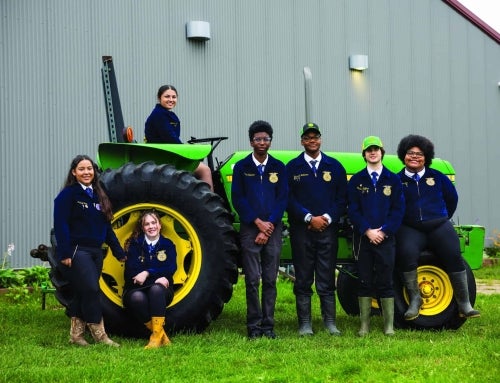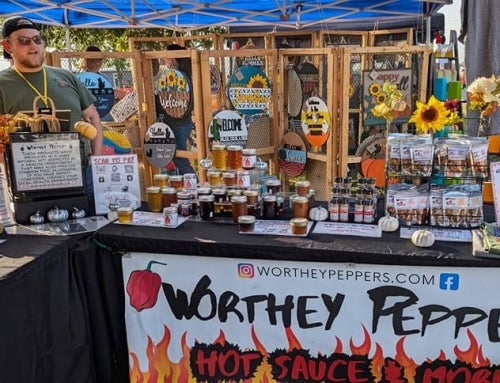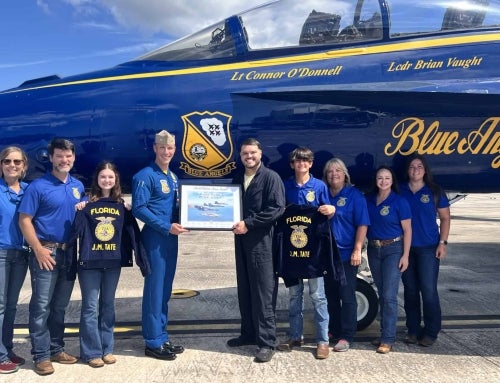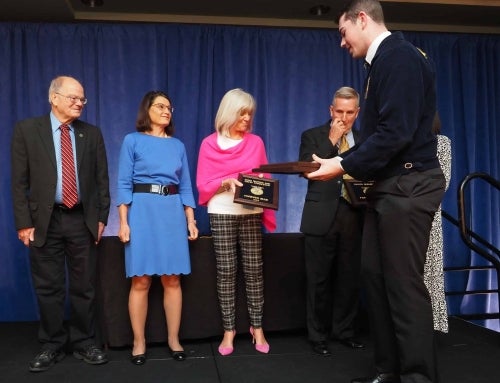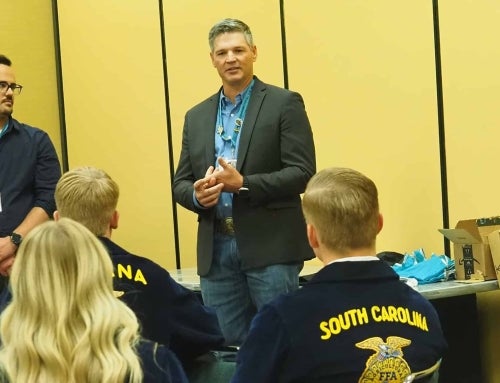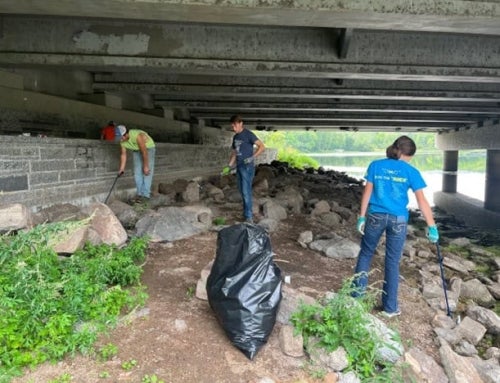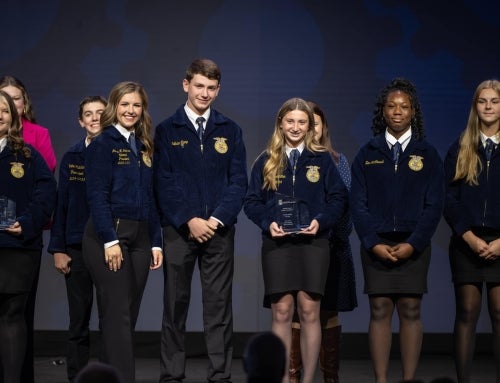Each year at the National FFA Convention & Expo, four FFA members are honored with American Star Awards for outstanding accomplishments in FFA and agricultural education.
The American Star Awards, including American Star Farmer, American Star in Agribusiness, American Star in Agricultural Placement and American Star in Agriscience, are presented to FFA members who demonstrate outstanding agricultural skills and competencies through completion of supervised agricultural experience (SAE). A required activity in FFA, an SAE allows students to learn by doing, by owning or operating an agricultural business, working or serving an internship at an agriculture-based business, or conducting an agriculture-based scientific experiment and reporting results.
Other requirements to achieve the award include demonstrating top management skills; completing key agricultural education, scholastic and leadership requirements; and earning an American FFA Degree, the organization’s highest level of student accomplishment.
The American Star in Agriscience is awarded to the FFA member who demonstrates the top agriscience-based SAE in the nation. Here are the 2022 winner and finalists for American Star in Agricultural Placement:
WINNER: Marin Lonnee, Georgia
Sustainable agriculture is a part of the agriculture industry that’s rapidly growing in size and importance, and Marin Lonnee has been working to make a difference in this field since elementary school.
Lonnee started participating in science fairs when she was a fourth grader, and she said it was her agriculture teacher who encouraged her to take things to the next level a few years later.
“The state of Georgia does require students who are in … FFA classes to have a supervised agricultural experience (SAE) project,” Lonnee said. “I was notified by the ag teacher at the time that I could use my agriscience project that I was already presenting at other events as a sixth grader, and so it kind of just built from that. And I was just lucky to have that mentor in my life to tell me that at the time.”
Lonnee, now a member of Oconee County FFA in Georgia, has an SAE focused on multiple areas of research, all generally unified under the banner of sustainability.
“It’s not just plant science and it’s not just animal science,” she said. “All my projects focus on … agriculturally dependent communities and developing them so that they are more productive and sustainable.”
These projects include research into bee pollination, hydroponics, plant pathology, plant breeding and even structural development. Despite her years of experiments, Lonnee said what she’s actually most proud of are the connections she’s made with other people in her field.
Marin credited her love for community-focused agriculture to the unconventional, ag-focused curriculum of her third grade teacher, Diane Parr.
“We did a lot of growing our own produce that got donated to soup kitchens locally,” Lonnee said. “She made it very community-oriented.”
Lonnee received an undergraduate degree in only three years, and now she’s looking to earn a master’s degree in forage research so she can continue doing what she loves.
“I’ve never worked in what people would call a normal job,” she said. “I’ve always worked in a lab, and it’s opened so many doors.”
Lonnee’s advice for FFA members starting their own SAE is twofold: find something that interests you and remember that agriculture is more than just farming.
“Don’t let someone tell you it’s not related to ag because you’re not directly working with cows [or] corn,” she said.
FINALIST: Danae Westra, California
Milk and dairy are cows’ gifts to the world, and Danae Westra wants to make sure they can keep on giving.
Westra, a member of Visalia-Central Valley Christian FFA in central California, has a supervised agricultural experience (SAE) focused on researching cattle. She has measured growth, protein levels, milk production rates and more in several long-term experiments through the years, starting when she was in high school.
“I kind of just got into it because I was interested in seeing more of the ‘behind the scenes’ of the dairy cow,” Westra said.
Her experiments have focused on finding the best ways to raise dairy cattle — what to feed them, what medicine to use, how to make them safer for human consumption and so on. Westra compares the results of her experiments with other dairy specialists in the area to determine what works and what doesn’t.
“I had the opportunity to talk to a few different dairymen throughout my projects, and I just bring my results to them,” Westra said. “Something I’m … proud of in these projects is the different relationships I’ve been able to build.”
Westra added that she meets at least three new dairy professionals with every experiment, ranging from nutritionists to veterinarians to farmers and more. Her FFA advisors were also invaluable resources, she said.
“They were able to just help me … learn so much more about the dairy industry than I thought was possible as a high school student,” she said.
Now enrolled at Dordt University in Iowa, Westra is studying agriculture education to become an FFA advisor. She said she’d still like to work with dairy cows on the side, though.
For FFA members starting their own SAE, her best advice is to get out of your comfort zone.
“Be ready to be challenged,” Westra said. “Your SAE is going to provide a lot of different opportunities for you, if you allow it to do so.”
FINALIST: Sydney Hefty, Indiana
Agriculture isn’t going anywhere, but it may look very different in the future as we adopt new technologies and practices. As a member of Dekalb FFA in Indiana, Sydney Hefty has always been forward-thinking in her research-based SAE.
“My [supervised agricultural experience (SAE)] mainly focuses on future technology and future concepts,” Hefty said. “All of my projects really focus on sustainability … because that is something that is prevalent and demanded more and more by consumers every year.”
Hefty’s SAE includes agriscience projects in multiple areas of research: mechanical science, plant science, social science and more. She has investigated wind energy, natural herbicides, hydroelectricity, and even public opinion on those three concepts.
Despite running all these experiments over many years, Hefty said she doesn’t actually have access to a laboratory.
“All of my projects are in the field, hands on,” she said. “I was never close enough to a university to have the access I needed … and I think that for my sort of research, it was a lot more valuable for me being out in the fields with my test plot.”
Hefty said her “test plot” is a section of her father’s farmland, and acquiring permission to use it wasn’t easy.
“It definitely took a little bit of convincing,” she said. “I worked with my dad [on] a plan where I would do some extra help around the farm if I could steal a little half-acre.”
Although agriscience has kept her plenty busy, Hefty also owns a goat herd, and she used the profits from her goats to fund her research. That money is currently going toward her agriculture economics major at Purdue University as well.
After she graduates from Purdue, Hefty said she’s planning to go to law school and become a corporate lawyer for an agriculture chemical company. Agriscience will always be her passion, though.
“If I don’t have my business and entrepreneurial skills to … make money from a job, then I’m never going to be able to take care of my passion,” she said.
Hefty’s advice for FFA members starting an SAE is to “make a small impact that will leave large ripples.”
“If you do something small that benefits your community, [that] small difference could change somebody else’s life down the road,” she said.
FINALIST: Ryan Hess, Texas
Many people in the agriculture industry got their start by doing the same job their parents did; but some folks, like Ryan Hess from Stephenville FFA in Texas, forged a different path in ag.
“I always came from an agricultural background,” Hess said. “It was more traditional, however, with the beef industry and raising a farm with my family. But once I got into high school, I wanted to broaden my experiences.”
As he explored FFA’s less traditional opportunities, Hess found himself studying plant systems for an agriscience fair project over the summer. Stephenville FFA gave him access to an “excellent” greenhouse, he said, and he liked it so much he turned it into a supervised agricultural experience (SAE).
“I just fell in love,” he said. “That’s [why] I chose to complete three more agriscience fairs throughout the rest of my high school career.”
Before graduation, Hess also completed science fair projects on food storage, public opinion surveys and horse health. He said three of his four projects made him a national champion in science fair competitions.
Now that he’s out of high school, Hess is majoring in agriculture communications at Texas Tech University. He said his prior work in surveys and social science inspired him to learn more about statistics and public relations.
“I’m currently wanting to find ways to communicate agriculture to the public,” Hess said. “It’s one thing to research those agriscience topics, but if us agriculturists can’t communicate that to the public, then there is that disconnect with the unity of everyone in our society.”
In terms of future plans, Hess said he’s keeping his options open for now. However, he said he’d like to keep giving back to the agriculture industry in some way, and he thanked all his Stephenville FFA advisors for helping him discover his passion.
Hess’ best advice for FFA members starting their own SAE is to never give up and always do more.
“That’s a little bit cliché, [but] I’m really grateful that I decided to take it a step further in my research,” he said. “The sense of gratification and fulfillment that completing a project gives you is very beneficial and it’s almost incomparable to the other experiences that I had in FFA.”
The American Star Awards are sponsored by Case IH, Elanco Animal Health and Syngenta. For more information on the awards, visit FFA.org.
General convention sessions will air live on RFD-TV and The Cowboy Channel. FFA members and supporters can tune in and watch gavel-to-gavel coverage of the event. To learn more, visit Convention.FFA.org.

